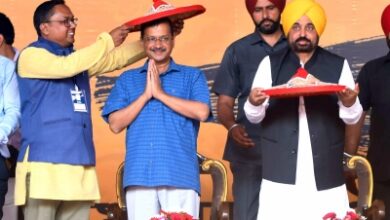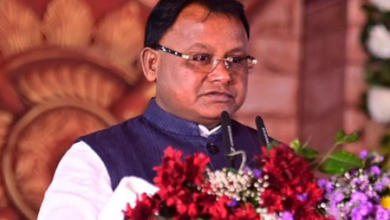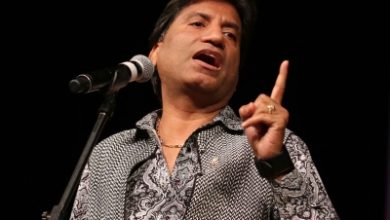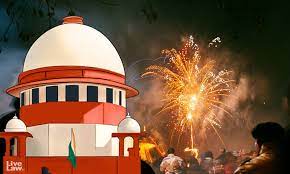Judiciary Shouldn’t Hide Its Problems: CJI
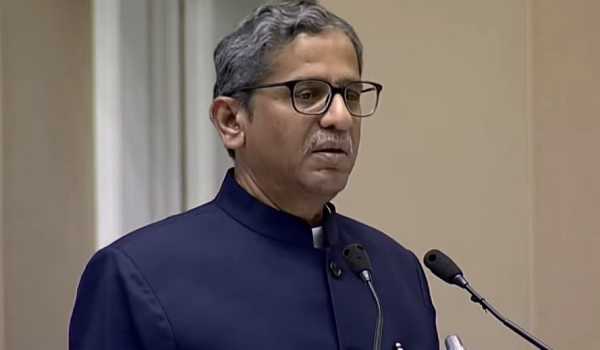
New Delhi, July 30: Judiciary should not hide its problems instead discuss the issues which hinder its functioning so that it can serve people better, Chief Justice NV Ramana said on Saturday.
The Chief Justice said this while addressing the delegates at the All India District Legal Services Authorities Meet organised at Vigyan Bhawan in New Delhi, which had Prime Minister Narendra Modi as the chief guest.
“There is no meaning in camouflaging or hiding the problems. If we don’t discuss these issues, if matters of pressing concern are not addressed, then the system will cripple.
“I fear, we may be unable to fulfill our constitutional mandate of social justice. I urge you therefore, to discuss, debate and decide! This is the principle I have been following all through,” CJI Ramana said.
The event was also also attended by Supreme Court judges, Justices UU Lalit and DY Chandrachud and Union Law Minister Kiren Rijiju.
Chief Justice Ramana said that the role of district judiciary is the “backbone of justice delivery system” in India, but still majority of the people suffer in silence, lacking awareness and necessary means.
“Modern India was built around the goal of removing the disparities in society. Project Democracy is about providing a space for the participation of all. Participation will not be possible without social emancipation. Access to justice is a tool for social emancipation,’ the CJI said.
Addressing the gathering, Modi said: “This is the time of Azadi ke Amrit Kaal. This is the time for the resolutions that will take the country to new heights in the next 25 years. Like Ease of Doing Business and Ease of Living, Ease of Justice is equally important in this Amrit Yatra of the country.”
The Prime Minister highlighted the place of legal aid in the Directive Principles of the State Policy. This importance is reflected in the faith of the citizens in the Judiciary of the country.
He said: “As important as access to the judicial system is for any society, justice delivery is equally important. The judicial infrastructure also has an important contribution to this. In the last eight years, work has been done at a fast pace to strengthen the judicial infrastructure of the country.”
Underlining India’s leadership in information technology and fintech, the Prime Minister stressed that there can not be a better time to introduce more power of technology to judicial proceedings.
He said: “Under the e-Courts Mission, virtual courts are being started in the country. Twenty-four-hour courts have started functioning for crimes like traffic violations. Video conferencing infrastructure is also being expanded in the courts for the convenience of the people.”
The Prime Minister said that more than one crore cases have been heard through video conferencing in the country.
This proves that “our judicial system is committed to the ancient Indian values of justice and, at the same time, is ready to match the realities of the 21st century”.
He further said “a common citizen should be aware of his rights and duties in the Constitution. They should be aware of their Constitution, and constitutional structures, rules and remedies. Technology can play a big role in this too”.
Union Law and Justice Minister Kiren Rijiju brought up the need to accelerate proceedings in family courts as they hold the key to future generation who are stuck by the whims and fancies of adults.
Rijiju flagged concern over piling cases in family courts. He said that the pendency in family courts is worrisome, why should children suffer due to problems between the adults, we should ensure faster disposal of these cases.
Echoing the prime minister’s views on providing legal aid and ensuring the release of undertrial prisoners, CJI Ramana said one of the most important aspects which calls for active consideration and intervention of the legal services authorities in the country is the condition of undertrials.
‘The prime minister and the attorney general have also rightly flagged this issue in the recently held conference of Chief Ministers and Chief Justices. I am happy to note that NALSA (National Legal Services Authority) is actively collaborating with all stakeholders in securing the much-deserved relief for undertrials.’ Justice Ramana said, and added that India, the second most populous country in the world with an average age of 29 years, has a large workforce.
The CJI also stressed the need for strengthening alternate dispute redressal (ADR) mechanisms like Lok Adalat, mediation and arbitration centres.
These ADR mechanisms have the potential to transform the legal landscape of India by providing millions of people a platform to settle their grievances, he said.
‘Matters ranging from matrimonial and intergovernmental disputes, government contracts and land acquisition can be attempted to be resolved through mandatory ADR. This will not only reduce pendency and backlog but also will provide a much-needed speedy justice to affected parties,’ Justice Ramana said.
The two-day meet, organised by NALSA, is being attended by over 1,200 delegates across the nation including the principal district and sessions judge of all the judicial districts and ex officio chairpersons of DLSAs and would discuss the implementation of the Unified Business Process for providing effective legal aid to the marginalised and poor.
With UNI Inputs….


